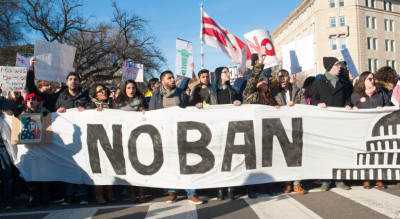Discrimination
Religion is never an excuse to discriminate. Get rid of religious loopholes that are rolling back hard-won civil rights.

Discrimination takes many forms, and the targets of discrimination are as diverse as the motivations behind it. A secular approach to dealing with discrimination reflects the duality of the religious clauses of the First Amendment. Discrimination is improper when it targets an individual for their beliefs or lack thereof. It is also improper to exempt religiously motivated actions from an otherwise valid anti-discrimination statute, thereby using government protection to endorse a particular religious belief.
History shows that at times only force of law can outweigh popular prejudices. American society has made vast improvements in the past 50 years in combating discrimination, and more Americans are choosing not to hide identities that may target them for abuse and ridicule. As we conquer new grounds of acceptance, conflicts emerge when rights are at odds with each other: namely, that operating in the public square requires compliance with all public laws and religion is only a valid justification for discrimination in the most limited of contexts.
Employment Discrimination: Our government has a long history of subsidizing the efforts of organizations providing social services. Historically, the same laws and regulations regarding how government funds were utilized and the hiring and firing practices for such programs applied to both secular and religious groups. Unfortunately, executive orders from President George W. Bush allow federally funded faith-based organizations to discriminate on the basis of religion in their hiring practices. This is an exemption to Title VII of the Civil Rights Act of 1964, which makes it unlawful for an employer to refuse to hire or fire any individual because of such individual’s religion.
Yet we do not hold salaries paid from taxpayer dollars to faith-based employees to the same standard. Religious organizations providing social services to U.S. citizens should be held to the same non-discrimination policies required of every other federal contractor and grantee. Religious organizations have a right to promote their beliefs and to ask their followers to live lives based on these beliefs. However, when religious organizations accept money from the federal or state governments to provide publicly accessible social services, they must agree to abide by certain regulations prohibiting discrimination against the very taxpayers who fund such activities. Faith-based organizations are not required to apply for or accept taxpayer funds if they believe their religious rights will be compromised.
These principles extend to employment protections for LGBT Americans. In many states it is currently legal for an employee to be fired solely for their sexual orientation or gender identity. In many of the states that have laws protecting LGBT employees there is an exemption for houses of worship, religiously affiliated nonprofits, and businesses. It is important to note that houses of worship are protected by the Constitution and do not require a legislative carve out. However, religiously affiliated hospitals and businesses should be held to the same standards of equality as other employers. No other class of citizens protected by anti-discrimination legislation is subject to such an exemption.
Discrimination in hiring and firing on the basis of gender identity or sexual orientation is wrong no matter the motivation. Laws that put religious exemptions in place set a dangerous precedent that religion is a valid justification for hate.
Housing Discrimination: The Fair Housing Act of 1968 contains several important protections to ensure that U.S. citizens are able to purchase housing free from discrimination. However, while the Act protects against discrimination against any one person because of race, color, religion, sex, familial status, or national origin, it does not protect against discrimination on the basis of gender identity or sexual orientation. Unfortunately, this lack of protection has led to numerous cases in which a landlord uses religious reasons, such as a scriptural prohibition on homosexuality, to discriminate against potential and current tenants on the basis of their sexual orientation or gender identity.
A 2017 study by the Urban Institute found that in three major metropolitan areas (Los Angeles, Dallas, and Washington D.C.), gay men and transgendered people were quoted higher prices, given less appointments, and told of fewer available rental units than their straight or non-transgendered counterparts. Still, most states still allow for discrimination against LGBTQ Americans, which can take several forms, including but not limited to: preventing same-sex couples from sharing a lease, preventing same-sex couples from both being on a homeowner’s insurance policy, and the refusal to rent or sell property to same-sex couples or transgender U.S. citizens. Most often, the reason for this discrimination is religious in nature, with landlords claiming that renting to an individual “living in sin” would be a violation of their religious beliefs. The ability to purchase housing free from discrimination must be a fundamental right for all U.S. citizens, regardless of how they look, who they love, or how they identify. Discrimination in housing on the basis of gender identity or sexual orientation is wrong no matter the motivation.
A federal law, or amendment to the original Fair Housing Act, should be introduced to add LGBTQ Americans to the protected classes regarding housing discrimination. This law or amendment should not contain any religious exemptions.
Related News

Heretic on the Hill: The Law of Unintended Consequences Can’t Be Repealed
If this goes down as the “Pay Me” presidency with President Trump playing the role of mafia boss, demanding payments from universities, tech companies, networks, and whomever else he can shake down, t…

From the Intern Desk: Let’s Future-Proof the Johnson Amendment
November 25, 2022
From the Intern Desk: “God is in the Gallery”
August 11, 2022
Heretic on the Hill: “I Do” Support Marriage Equality
August 6, 2022Related Actions





